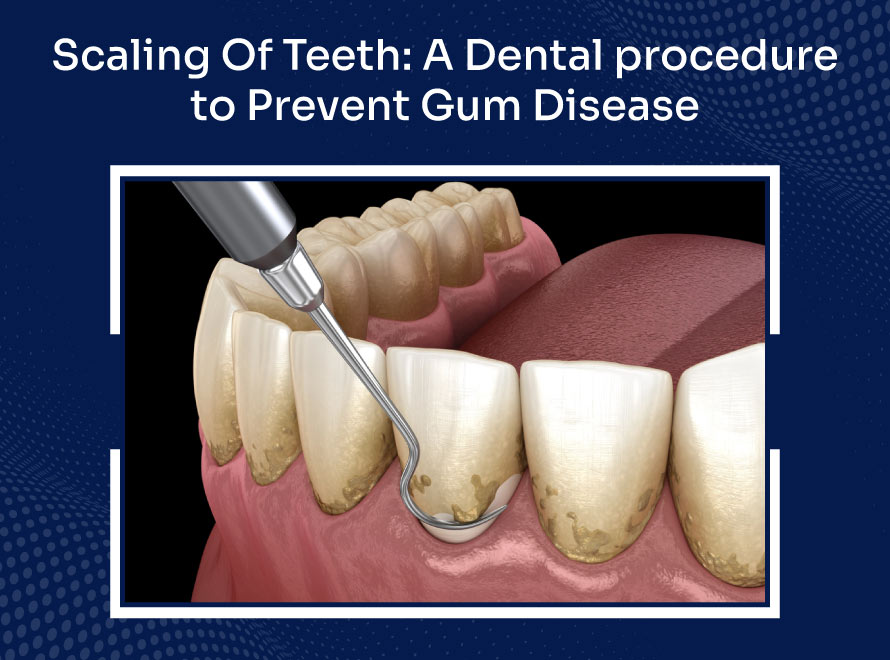Did you know that more than 70% of adults face gum issues at some point in their life? However, the good news is this is a common dental problem and can be mostly averted. One of the most effective preventive procedures is the scaling of teeth, a deep-cleaning technique aimed at removing hardened plaque (tartar) and bacteria from the gumline. Unlike routine cleaning, scaling addresses deeper gum pockets, ensuring healthier teeth and gums. If left untreated, the plaque buildup may cause periodontitis, a serious form of gum disease that may lead to loss of teeth. This makes scaling not just beneficial but important in order to maintain good oral health.
A] What is Dental Scaling?
Dental scaling is a common dental procedure, which is also known as deep cleaning, that involves the meticulous removal of plaque and tartar from the teeth, above and below the gumline. It is usually prescribed to the patients who exhibit symptoms of gingivitis or mild periodontal disease. But what makes it different from regular cleaning?
Regular dental cleaning usually concentrates on visible surfaces of the teeth. In contrast, dental scaling delves deeper, cleaning pockets around the gums where bacteria thrive. Dentists recommend dental scaling when gum pockets exceed 4 mm in depth or when there’s visible tartar buildup under the gumline. Early intervention helps avoid more invasive procedures in the future.
Improve Oral Health with Scaling of Teeth – Schedule Visit
B] What Are the Different Types of Dental Scaling?
Dental scaling is not a one-size-fits-all procedure. Depending on the patient’s condition and available technologies, dentists can choose several techniques, such as:
1. Manual Scaling
In this traditional method, handheld tools such as scalers and curettes are used. The dentist removes the deposits of the plaque and tartar manually on the surface of the teeth and the gum pockets. Although this approach is time-consuming, the manual type of scaling is more tactile, suggesting that for precision areas, this method will suit the requirement. This approach is time-consuming, but the result is worth it, making it ideal for precise areas.
2. Ultrasonic Scaling
Ultrasonic scaling is one of the most widespread procedures nowadays, based on high-frequency vibrations and the water spray to dislodge tartar and bacterial biofilm. It is faster, more efficient, and more comfortable for the patient as compared to the manual methods.
3. Laser Scaling
Laser scaling is a less invasive technique that involves the use of focused light energy to target infected tissue and calculus. It reduces bleeding and discomfort and supports healing. It is becoming Although not as widely available, it is gaining popularity in advanced periodontal care.
Each of these techniques has both pros and cons, though your dentist will choose the best option that fits your dental health condition.
C] How is Scaling of Teeth Done? Step-by-Step Process
Wondering exactly how is scaling of teeth done? Below is the step-by-step breakdown to demystify the process:
1. Pre-Procedure Examination
It starts with an elaborate oral examination, including measuring the pocket depth and the amount of bone injuries with the use of periodontal probes and X-rays. This is used to identify the severity of the gum disease and plan an appropriate treatment.
2. Local Anesthesia (with the Usage of As Necessary)
During treatment, a local anaesthesia can be used to numb the treatment area. This ensures patients feel minimum pain in the process.
3. Plaque and Tartar Removal Above the Gumline
With the aid of manual instruments or the ultrasonic scalers, the dentist removes the deposited tartar on the visible surfaces of the teeth. This process is necessary to prevent bacterial growth, which may result in inflammation.
4. Root Planing (Below Gumline Cleaning)
This includes the smoothing of the teeth roots to get rid of the remaining plaque and the bacterial toxins. Root planing also helps gums to reattach to the teeth, reduce pocket depth and halt any progression of the infection and disease.
5. Polishing and Final Inspection
Lastly, teeth are polished with a special paste to wipe off minor stains and smooth out surfaces. The dentist will then recheck the cleaned area to ensure all the tartar has been effectively removed.
This thorough process of teeth scaling showcases its importance in both prevention and treatment.
D] Duration and Session Requirements
The number of sessions required for scaling of teeth depends on the extent of plaque buildup and gum health. Some patients may require a single session, whereas others may require a more compartmentalised measure.
Here’s what to expect:
- Single session: Works well with an individual affected with mild plaque and who does not have the gum disease.
- Multiple sessions: It is advisable where the case is moderate to severe.
- Quadrant method: The mouth is partitioned into four sections, and each is cleaned individually.
- Duration of sessions: A single session can take about 45-60 minutes depending on severity.
This is a focused process to allow effectiveness and comfort to be maintained, particularly for patients with sensitive teeth or deep gum pockets. To get a precise estimate tailored to your condition, it’s best to consult a professional. Dr Dipika Bharani provides dental care in Mumbai, committed to offering a personalised treatment plan to keep your oral health at its best.
E] What Are The Benefits of Teeth Scaling?
Teeth scaling provides an extensive range of benefits rather than just a cleaner-looking set of teeth. Below are some essential components of professional dental care:
I. Primary Health Benefits
- Helps prevent and treat gum disease at its root
- Effectively cleans and rids dangerous bacteria from deep gum pockets
- Reduces the gums inflammation and bleeding
- Prevents eventual tooth loss caused by advanced periodontitis
II. Cosmetic Benefits
- Get rid of bad breath significantly
- Offer a neater and polished appearance
- Aids in removing superficial stains caused by tea, coffee, and tobacco
III. Long-term Oral Health Benefits
- Reduces or prevents the development of periodontitis
- Promotes superior gum reattachment and gum health
- Minimises the chances of associated system disease such as heart disease and diabetes
The numerous teeth scaling benefits make it a smart investment in your long-term oral and overall health.
F] What Are The Aftercare and Maintenance Tips Post-Dental Scaling?
Proper aftercare is crucial to make the most of your dental teeth scaling procedure. Below are a few tips for aftercare and maintenance:
Immediate Post-Procedure Care (First 24-48 hrs)
Pain Management Techniques:
- Prescribed pain relief medications
- Swelling – intimidating lymphatic movement by cold compress
- Avoid eating extreme hot or cold foods
- Use warm saltwater solution and rinse with it
Recommended Oral Care Products:
- Use toothbrush with soft bristles for gentle cleaning
- Antimicrobial mouthwash to prevent infection
- Fluoride toothpaste to prevent enamel
- Specialised aftercare products offered by your dentist
Long-term Maintenance
Proper aftercare following dental scaling requires consistent home care routines and professional follow-up appointments. To prevent gum irritation, patients should use antimicrobial mouthwash two times a day and prefer gentle brushing techniques. Regular professional cleanings every two to six months will help future prevention of the tartar, and everyday flossing will remove the plaque between teeth where scaling instruments worked most intensively.
Improve Oral Health with Scaling of Teeth – Schedule Visit
Conclusion
If you’ve ever wondered, is scaling good for teeth, the answer is a resounding yes. It is a preventive, restorative, and aesthetic treatment to protect your oral health against gum issues and long-term damage. With proper aftercare and routine checkups, the benefits are long-lasting. For expert evaluation and care, consult a trusted dentist near Santacruz East, Mumbai, to ensure your smile stays healthy, clean, and confident for years to come.
Frequently Asked Questions
1. Does scaling damage teeth?
No, dental scaling does not damage teeth when performed by a skilled professional. It targets only the tartar and plaque and does not affect the enamel.
2. How Often Should You Get Dental Scaling Done?
For most people, every 6 months is recommended. However, they are more often required for those who are dealing with periodontal disease.
3. Is scaling painful?
No, it does not hurt! However, a few patients have reported mild discomfort, particularly in sensitive areas, but local anaesthesia is commonly used to ensure maximum comfort during the procedure.
4. How long does sensitivity last?
A mild sensitivity can last 2-3 days. Applying desensitising toothpaste is normally beneficial during this time.
5. Can I eat normally after scaling?
You are advised to take no hot, spicy, or hard food for the first 24 hours post-procedure.
6. How soon can I brush my teeth?
The same-day brushing is allowed. However, you need to apply a soft-bristled brush, with no excessive force.
7. Will my gums bleed after scaling?
It is normal to have some bleeding, especially if the gums were inflamed. It will wear off after a day or so.
8. Who Should Consider Teeth Scaling?
Anyone with gum disease symptoms, tartar buildup, or persistent bad breath should undergo dental scaling. Smokers, diabetics, and people who tend to have gum problems in particular can go for it.

Dr. Dipika Bharani
Dr. Dipika Bharani, founder of Dentalfix Clinic in Vile Parle East, is an expert in cosmetic dentistry, including smile designing and teeth whitening. With advanced training from international universities, she is skilled in wisdom tooth surgeries, TMJ disorders, and trauma-related dental care, offering comprehensive solutions for a wide range of dental needs. Read More

